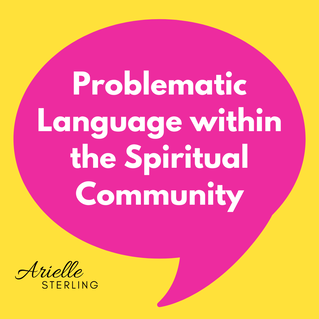 In the vast and diverse realm of spirituality, effective communication is key to fostering understanding and growth within the community. However, it is crucial to recognize that certain words and phrases can be problematic, perpetuating stereotypes, cultural appropriation, and exclusion. We can cultivate a more inclusive and respectful spiritual community by addressing these issues and promoting mindful language. This blog post will delve into the problematic words and phrases commonly used within spiritual circles, exploring their implications and offering alternative approaches. Together, we can move towards more mindful communication and embrace the richness of diversity within the spiritual community. "Enlightened" or "Higher Consciousness"These terms often imply that some individuals are more spiritually advanced than others, creating a hierarchy that can be exclusive and judgmental. It is crucial to remember that each person's spiritual journey is unique, and there is no single path or destination. Emphasizing growth and personal development rather than levels of enlightenment promotes a more inclusive and supportive environment. "Good Vibes Only"While the concept of vibes can be used to describe the energy and atmosphere of a space or interaction, the phrase "good vibes only" can dismiss and invalidate negative emotions or experiences. Acknowledging and validating the full range of human emotions is important, creating a safe space for individuals to express their authentic selves. "Manifestation" or "Law of Attraction"While positive thinking and setting intentions can be empowering, the idea that individuals are solely responsible for their circumstances can be misleading and dismissive of systemic issues and privilege. It is important to acknowledge that external factors can impact one's journey and to promote a balanced perspective that combines personal agency with recognition of broader social contexts. "Everything happens for a reason"While this phrase is often used to find solace in difficult times, it can dismiss people's pain and suffering. It implies that every challenge is part of a greater plan, disregarding individual experiences and emotions. Instead, let's offer support, empathy and acknowledge that life's events can be random, unfair, and deeply painful. "You attract what you think"The concept of the law of attraction suggests that our thoughts and intentions shape our reality. While it is valuable to focus on positive thinking, this phrase can inadvertently blame individuals for their misfortunes. It overlooks systemic factors and ignores the complexities of life. Remember, everyone faces unique circumstances, and compassion should prevail over judgment. "Love and Light"This phrase is often used as a well-intentioned blessing. However, it can inadvertently invalidate or ignore people's struggles, challenges, and darkness. By exclusively focusing on love and light, we fail to acknowledge the richness of the human experience, which encompasses a wide range of emotions. Let's embrace the wholeness of our light and dark existence and support one another through it all. "You create your reality"While personal agency and self-empowerment are vital, this phrase overlooks external factors that impact our lives, such as systemic inequalities, socioeconomic circumstances, and historical disadvantages. Recognizing that not everyone has equal opportunities is crucial, and attributing success or failure solely to an individual's thoughts can be unfair and dismissive. "Raise Your Vibration"Raising one's vibrations refers to elevating one's energy levels to a more positive state. However, this phrase can inadvertently create a hierarchy of emotions, implying that certain emotions are better than others. It is important to honor and validate the full spectrum of human emotions, acknowledging that all feelings have value and purpose. Cultural AppropriationCultural appropriation is an important topic within the spiritual community, highlighting the need for respectful engagement with diverse cultural practices and traditions. While the quest for spiritual growth often involves exploring different paths and drawing inspiration from various sources, it is crucial to approach cultural exchange with sensitivity, education, and a genuine desire to honor and understand the significance of those practices. By actively seeking guidance from diverse voices within the different cultures and acknowledging and respecting the boundaries and origins of specific traditions, the spiritual community can foster a space of cultural appreciation rather than appropriation. Moving toward a more inclusive and informed approach will enrich our spiritual journeys and create a community that values and uplifts the diverse cultural heritage that contributes to the tapestry of spirituality. "Karma"The term "karma" originates from Hinduism and Buddhism, describing the consequences of one's actions. However, it is often misused in popular culture and the spiritual community to justify and pass judgment on others. Encouraging a deeper understanding of karma's complexities and emphasizing compassion and empathy helps create a more harmonious and supportive community. "Gypsy""Gypsy" historically refers to the Romani people, an ethnic group from South Asia who migrated to various parts of the world. Unfortunately, the term has often been misused and romanticized, leading to stereotypes and cultural appropriation. It is important to understand that using "Gypsy" in a casual or non-Romani context can be offensive and perpetuate harmful stereotypes. Instead, it is recommended to use "Romani" or "Romani people" to refer to this ethnic group, respecting their history, culture, and identity. "Tribe"While the term "tribe" traditionally referred to indigenous communities or small, close-knit societies, its use within the spiritual community has expanded to describe groups or communities that share common interests or beliefs. However, using "tribe" in this context can be considered cultural appropriation, as it fails to acknowledge the unique cultural and historical significance of indigenous tribes worldwide. It is important to respect and honor indigenous peoples' cultural diversity and experiences by avoiding the casual use of the term "tribe" outside of its original context. "Shaman""Shaman" originates from indigenous cultures and refers to specific spiritual leaders or healers within those communities. Using the term outside its cultural context can be appropriative and disrespectful to indigenous traditions. Using alternative words like "energy healer" or "spiritual practitioner" to describe similar practices without appropriating indigenous cultures is advisable. "Spirit Animal"The concept of having a spirit animal comes from indigenous cultures with deep spiritual and cultural significance. Using the term without understanding or respecting its origins can trivialize and appropriate indigenous beliefs. It is more appropriate to use terms like "animal guide" or "animal totem" to express the idea of an animal symbolizing personal qualities or spiritual guidance. "Smudging"The practices of cleansing and smudging have roots in indigenous cultures, specifically the burning of sacred herbs. When using these terms, it is crucial to acknowledge and respect the cultural traditions from which they originate. Inappropriate use or commercialization of these practices can perpetuate harmful stereotypes and disrespect indigenous cultures. It is important to seek understanding and learn about specific cultural practices before incorporating them into one's spiritual practice. Promoting Inclusive LanguageNow that you have the awareness about problematic language used in the spiritual community, you have the opportunity to make a change in the language that you use. Here are some ways that you can promote inclusive language:
Language shapes our perceptions, beliefs, and interactions. Within the spiritual community, it is essential to use language that is respectful, inclusive, and mindful of the experiences and identities of different individuals and communities. By avoiding the casual use of appropriated terms and opting for more accurate and culturally sensitive language, we can contribute to a more inclusive and harmonious spiritual community that respects and appreciates the diversity of humanity. The spiritual community should strive to be a place of acceptance, understanding, and growth. By being mindful of our words and phrases, we can create an inclusive, respectful, and supportive environment for all individuals on their spiritual journeys. Let us embrace open dialogue, empathy, and an awareness of our words' impact on others, fostering a harmonious and connected community. Remember, our language has the power to heal and uplift, so let us choose our words wisely as we navigate this spiritual path together.
0 Comments
Leave a Reply. |
Arielle SterlingArielle is a best-selling author, holistic life coach and intuitive energy healer. Archives
July 2024
Categories
All
|


 RSS Feed
RSS Feed